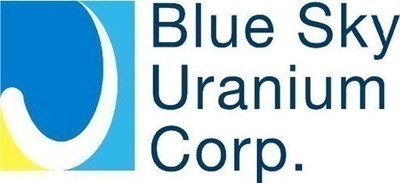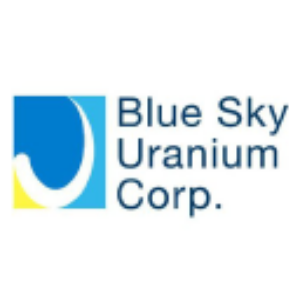Blue Sky Uranium Launches Field Work and Advances two Priority Exploration Targets within the Amarillo Grande Project, Argentina
Rhea-AI Summary
Blue Sky Uranium Corp. has announced a comprehensive field exploration program at its Cateo Cuatro sector and has moved the Ivana East target to the drill-testing stage. The Ivana East target is located 10 km east of the Ivana deposit, while Cateo Cuatro is 32 km southwest. These targets were prioritized to identify additional uranium deposits within the Amarillo Grande Uranium-Vanadium Project in Rio Negro Province, Argentina. The exploration program includes geological mapping, auger drilling, and radiometric surveys, building on extensive geological data reviewed since 2012.
Positive
- Initiation of a comprehensive exploration program for potential uranium deposits in two prioritized target areas.
- Advancement of the Ivana East target to the drill-testing stage, indicating progress in the exploration strategy.
Negative
- Previous auger drilling results showed no significant down-hole radiometric anomalies at Ivana East.
- The exploration program is contingent upon the completion of fieldwork at Cateo Cuatro, which may delay progress.
News Market Reaction 1 Alert
On the day this news was published, BKUCF declined 6.37%, reflecting a notable negative market reaction.
Data tracked by StockTitan Argus on the day of publication.
TSX Venture Exchange: BSK
Frankfurt Stock Exchange: MAL2
OTCQB Venture Market (OTC): BKUCF
VANCOUVER, BC, Sept. 26, 2022 /PRNewswire/ - Blue Sky Uranium Corp. (TSXV: BSK) (FSE: MAL2) (OTC: BKUCF) ("Blue Sky" or the "Company") is pleased to announce that the Company is launching a comprehensive field exploration program at the Cateo Cuatro sector to refine drilling targets, and has advanced the Ivana East target to the drill-testing stage. The Ivana East target is 10km east of the Ivana deposit while Cateo Cuatro is located 32km to the southwest. These important targets have been prioritized by the Company as part of its strategy aimed at defining additional uranium deposits within the 145km long and wholly owned Amarillo Grande Uranium-Vanadium Project in Rio Negro Province, Argentina ("AGP").
As reported on November 2, 2020, these target areas were identified through Blue Sky's ongoing detailed review and reinterpretation of over 15 years of geological data and classification of compelling targets with high potential for uranium-vanadium mineralization like the Company's cornerstone Ivana deposit (see Figure 1).
Nikolaos Cacos, Blue Sky President & CEO commented, "These two targets show significant similarities to the geological environment present at our Ivana deposit, which it is advancing towards prefeasibility studies. The definition of both targets represents the results of a persistent comprehensive exploration program along the district scale Amarillo Grande Project, and their location close to the Ivana Deposit may represent a potential for the discovery of a cluster of deposits."
The Cateo Cuatro target area was initially prospected in 2013, with preliminary mapping, auger drilling, and water sampling completed at that time. The recently launched comprehensive exploration program at Cateo Cuatro will include geological mapping, auger drilling, radiometric surveying, seismic and/or IP tomography surveys and reverse circulation ("RC") drilling. The Ivana East target was also initially identified in 2012 through an airborne radiometric survey. At that time limited, surface radiometric surveying and auger drilling were carried out and seismic and IP-tomography surveys were completed in 2021; Ivana East is ready for initial RC drill testing. Drilling at both targets will be carried out after the Cateo Cuatro field work is complete.
The Ivana East target is located 10km northeast of the Ivana deposit, in the southern portion of the Amarillo Grande project. The area was initially identified in 2012 by airborne radiometric surveys which detected NW-SE elongated anomalies that were followed up by limited hand-held ground radiometric surveys and auger drilling. The follow-up hand-held radiometric survey confirmed surface anomalies and led to the drilling of 13 shallow auger holes to a maximum of 4.35m depth with no down-hole radiometric anomalies detected.
A geological review in 2019 and 2020 established that the area exhibits geological similarities to the Ivana deposit setting with the interpretation that sediments of the uranium host Chichinales Formation unconformably overly intrusive and metamorphic basement rocks at relatively shallow depth. Two different geophysical surveys were conducted over the target for the indirect confirmation of this geological relationship, which is interpreted to have potential for hosting blind basal channel uranium mineralization, similar to the Ivana deposit (see Figure 2).
Radiometric anomalies on surface ranging up to 1831 counts per second (cps) are interpreted as remobilized uranium precipitated by evaporation at surface; the uranium source potentially being related to leaching from blind uranium mineralization at depth close to the unconformity contact between the basal conglomerate member of the Chichinales formation and the underlying basement rock. This is analogous to the geological relationship present at the Ivana deposit where the component main uranium mineralization was defined, 10 km to the west of Ivana East.
Two 4km induced polarization (IP) pole-dipole tomography survey lines were run over the central portion of the Ivana East target where radiometric anomalies had been detected on surface. The survey was run by Geofísica Argentina S.A. using a transmitter VIP 5000 and receptor Iris Elrec Pro (10 channels/time domain), applying a "roll along" array. The pseudo-sections display a similar pattern to those from over the Ivana deposit.
The chargeability/resistivity pseudo sections indicate the presence of flat-lying high conductivity horizons, interpreted as high porosity, water filled, sands and conglomerates of the Chichinales formation, overlaying lower conductivity units potentially representing the basement rocks. Very low conductivity horizons observed at surface are interpreted to represent calcrete units, common in the area. The chargeability pseudo-sections show subtle high features within the high conductivity horizons like those observed at Ivana deposit, believed to relate to zones containing oxidized pyrite and organic matter which are related to uranium mineralization (see Figure 3).
A seismic tomography refraction survey was also carried out at Ivana East by Geoservicios that used a Mae Instruments Advanced SYSMATRACK device and geophones with high sensitivity (80 V/m/s 4.5Hz) and central frequency. The data was collected from four profiles, between 1.2 and 1.4km each with length between stations of 120m, using 24 geophones separated 5m apart.
The data collected were P-waves and multi-analysis superficial waves (MASW) and the properties obtained were velocity of P and S waves (Vp and Vs). Pseudo-sections for parameters Vp, Vs and Vp/Vs were generated. They are interpreted to display changes in the physical characteristics of the subsurface geology allowing a geological model to be constructed (see Figure 4).
This methodology had not been applied before at the Amarillo Grande project and therefore a reference test line was completed over the Ivana deposit where the geology is already known in detail. The results showed excellent definition at shallow depths when rock units with highly contrasting density are present; at the Ivana deposit poorly consolidated sediments overlie igneous and metamorphic basement rocks. Similar geological conditions are interpreted to be present at Ivana East target, and are also observed at Cateo Cuatro target.
The survey at Ivana East comprised three lines with some overlap, collectively covering a total of 4km. The pseudo-sections for the different parameters (Vp, Vs and Vp/Vs) were used to interpret the different type of rocks present and generate a geological model with a significant level of detail for 50 to 100m below surface (see Figure 5).
The interpreted geologic section comprises basement rock at depth unconformably overlain by a package of sedimentary rocks increasing in thickness to the east. Within the sediment package, it was possible to interpret coarse grain sedimentary horizons (conglomerates and sands) as well as fine-grained horizons likely related to tuffaceous sand, siltstone, and claystone. These sequences are interpreted as basal and middle member of the Chichinales formation, respectively, which may be interbedded to the east with Bajo del Gualicho lacustrine sediments where the sedimentary wedge thickens.
The IP and seismic targets at Ivana East with similar signatures to the Ivana deposit are interpreted to be between 10m and 30m depth and will be tested with an upcoming RC drilling program.
The Cateo Cuatro target area is located 32 kilometres southwest of the Ivana deposit and was initially recognized in 2012. Field work at that time included mapping, hand-held radiometric surveying, soil and pit sampling, and auger drilling. A total of 55 auger holes were drilled and surveyed with a down-hole radiometric probe in 2013 in the southern portion of the target area. The auger holes were shallow, with an average depth of 4.0m and a maximum depth of 9.5m. The holes were surveyed using a calibrated Mount Sopris radiometric probe which detected anomalies ranging from 70 to 1575 cps related to altered sandstones; some of the anomalies were open to depth.
The current geological model based on public aeromagnetic surveys indicates the presence of a NE-SW basin filled by Tertiary-aged Chichinales Formation fluvial sediments unconformably overlying basement rocks of the North Patagonian metamorphic/igneous complex or Cretaceous redbeds of the Neuquen Group (see Figure 6).
The previously completed auger holes encountered a variety of alteration patterns in Chichinales Formation sandstones, pebbly sandstones and carbonaceous sandstones interpreted to reflect proximity to a REDOX front like the one observed at the Ivana deposit (see Figure 7). The planned exploration program includes geological mapping, geochemistry and radiometric surface surveys, auger drilling in prospective areas, seismic and/or IP geophysical surveys, followed by RC drilling.
On August 12, 2022, the Company adopted a
The design of the Company's exploration program was undertaken by the Company's geological staff under the supervision of David Terry, Ph.D., P. Geo. Dr. Terry is a Director of the Company and a Qualified Person as defined in National Instrument 43-101. The contents of this news release have been reviewed and approved by Dr. Terry.
The Company's
The Project includes several other target areas over a regional trend, at or near surface. The area is flat-lying, semi-arid and accessible year-round, with nearby rail, power and port access. The Company's strategy includes delineating resources at multiple areas and advancing the project to prefeasibility level.
For additional details on the project and properties, please see the Company's website: www.blueskyuranium.com.
Blue Sky Uranium Corp. is a leader in uranium discovery in Argentina. The Company's objective is to deliver exceptional returns to shareholders by rapidly advancing a portfolio of surficial uranium deposits into low-cost producers, while respecting the environment, the communities, and the cultures in all the areas in which we work. Blue Sky has the exclusive right to properties in two provinces in Argentina. The Company's flagship Amarillo Grande Project was an in-house discovery of a new district that has the potential to be both a leading domestic supplier of uranium to the growing Argentine market and a new international market supplier. The Company is a member of the Grosso Group, a resource management group that has pioneered exploration in Argentina since 1993.
ON BEHALF OF THE BOARD
"Nikolaos Cacos"
______________________________________
Nikolaos Cacos, President, CEO and Director
Neither TSX Venture Exchange nor its Regulation Services Provider (as that term is defined in policies of the TSX Venture Exchange) accepts responsibility for the adequacy or accuracy of this release.
This news release may contain forward-looking statements. Forward-looking statements address future events and conditions and therefore involve inherent risks and uncertainties. All statements, other than statements of historical fact, that address activities, events or developments the Company believes, expects or anticipates will or may occur in the future, including, without limitation, statements about the Company's plans for its mineral properties; the Company's business strategy, plans and outlooks; the future financial or operating performance of the Company; and future exploration and operating plans are forward-looking statements.
Forward-looking statements are subject to a number of risks and uncertainties that may cause the actual results of the Company to differ materially from those discussed in the forward-looking statements and, even if such actual results are realized or substantially realized, there can be no assurance that they will have the expected consequences to, or effects on, the Company. Factors that could cause actual results or events to differ materially from current expectations include, among other things: the impact of COVID-19; risks and uncertainties related to the ability to obtain, amend, or maintain licenses, permits, or surface rights; risks associated with technical difficulties in connection with mining activities; and the possibility that future exploration, development or mining results will not be consistent with the Company's expectations. Actual results may differ materially from those currently anticipated in such statements. Readers are encouraged to refer to the Company's public disclosure documents for a more detailed discussion of factors that may impact expected future results. The Company undertakes no obligation to publicly update or revise any forward-looking statements, unless required pursuant to applicable laws. We advise U.S. investors that the SEC's mining guidelines strictly prohibit information of this type in documents filed with the SEC. U.S. investors are cautioned that mineral deposits on adjacent properties are not indicative of mineral deposits on our properties.
![]() View original content to download multimedia:https://www.prnewswire.com/news-releases/blue-sky-uranium-launches-field-work-and-advances-two-priority-exploration-targets-within-the-amarillo-grande-project-argentina-301632662.html
View original content to download multimedia:https://www.prnewswire.com/news-releases/blue-sky-uranium-launches-field-work-and-advances-two-priority-exploration-targets-within-the-amarillo-grande-project-argentina-301632662.html
SOURCE Blue Sky Uranium Corp.







